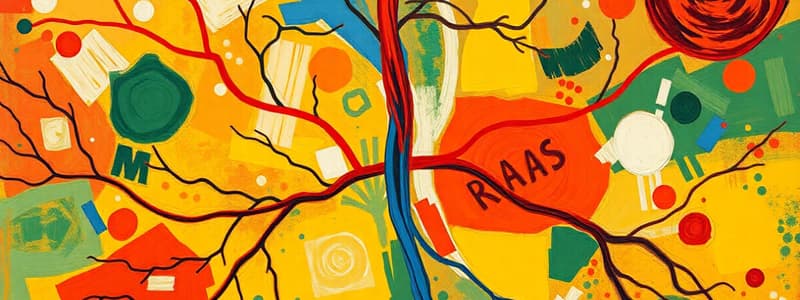Podcast
Questions and Answers
What is the main characteristic of primary hypertension?
What is the main characteristic of primary hypertension?
- It typically results from excessive physical activity.
- It cannot be traced to a specific cause. (correct)
- It has a clear identifiable cause.
- It is associated with stress and anxiety.
Which of the following factors is NOT a risk factor for primary hypertension?
Which of the following factors is NOT a risk factor for primary hypertension?
- Frequent exercise (correct)
- Advanced age
- Genetics
- Obesity
Which drug class works by blocking Angiotensin II receptors?
Which drug class works by blocking Angiotensin II receptors?
- ACE inhibitors
- Beta-blockers
- Diuretics
- Angiotensin II Receptor Blockers (ARBs) (correct)
What is a common side effect of ACE inhibitors related to bradykinin?
What is a common side effect of ACE inhibitors related to bradykinin?
Which condition is a contraindication for the use of ACE inhibitors?
Which condition is a contraindication for the use of ACE inhibitors?
What physiological effect does Angiotensin II primarily exert?
What physiological effect does Angiotensin II primarily exert?
What role does renin play in the RAAS system?
What role does renin play in the RAAS system?
What is a primary role of aldosterone in hypertension?
What is a primary role of aldosterone in hypertension?
Which of the following is a symptom of angioedema associated with ACE inhibitors?
Which of the following is a symptom of angioedema associated with ACE inhibitors?
What is the primary effect of RAAS activation on blood pressure?
What is the primary effect of RAAS activation on blood pressure?
Flashcards
Hypertension
Hypertension
High blood pressure; the force of blood against blood vessel walls is too high.
Primary Hypertension
Primary Hypertension
High blood pressure with no identifiable cause.
Secondary Hypertension
Secondary Hypertension
High blood pressure with an identifiable cause.
RAAS (Renin-Angiotensin-Aldosterone System)
RAAS (Renin-Angiotensin-Aldosterone System)
Signup and view all the flashcards
ACE Inhibitors
ACE Inhibitors
Signup and view all the flashcards
Angiotensin II
Angiotensin II
Signup and view all the flashcards
ACE
ACE
Signup and view all the flashcards
Angioedema
Angioedema
Signup and view all the flashcards
Hyperkalemia
Hyperkalemia
Signup and view all the flashcards
ARB's (Angiotensin II Receptor Blockers)
ARB's (Angiotensin II Receptor Blockers)
Signup and view all the flashcards
Study Notes
Hypertension
- Hypertension is a condition where the force of blood pushing against the walls of blood vessels is too high
- Measured in mmHg (millimeters of mercury)
- Normal blood pressure is 120/80
- Systolic pressure (during contraction)
- Diastolic pressure (during relaxation)
Primary Hypertension
- Unknown cause
- Risk factors include: obesity, lack of exercise, genetics, age, and stress.
Secondary Hypertension
- Caused by other conditions
- Risk factors include: kidney disease, sleep apnea, and certain medications.
Drug Treatment for Hypertension
-
ACE Inhibitors
- Block the production of angiotensin II, which constricts blood vessels
- Examples: Lisinopril, Captopril
- Side effects include: dry cough, hyperkalemia, and angioedema.
-
Angiotensin II Receptor Blockers (ARBs)
- Block angiotensin II from binding to receptors
- Examples: Losartan, Valsartan
-
Diuretics
- Increase the excretion of sodium and water from the body
Mechanism of Action (ACE Inhibitors)
-
ACE converts angiotensin I to angiotensin II leading to vasoconstriction and increased blood pressure
-
ACE inhibitors block this reaction
-
Angiotensin II leads to vasoconstriction, aldosterone release, and reduced sodium excretion
-
Bradykinin is a vasodilator and its increased levels may cause a dry cough
-
ACE inhibitors increase bradykinin, causing a dry cough
-
ARBs do not affect bradykinin levels.
-
Other drugs can be used, depending on the cause and severity of the condition.
Mechanism of Action (ARBs)
- ARBs block the angiotensin II at the receptor sites
- This prevents vasoconstriction, reducing blood pressure
- Reduces aldosterone release, leading to increased sodium excretion
Side Effects of Hypertension Medications
- Dry cough (ACE Inhibitors)
- Hyperkalemia (both ACE inhibitors and ARBS)
- Angioedema (both ACE inhibitors and ARBS)
- Dizziness
- Headaches
Other information
- Congestive heart failure
- Diabetic nephropathy
- Pregnancy
- Hyperkalemia
Studying That Suits You
Use AI to generate personalized quizzes and flashcards to suit your learning preferences.




